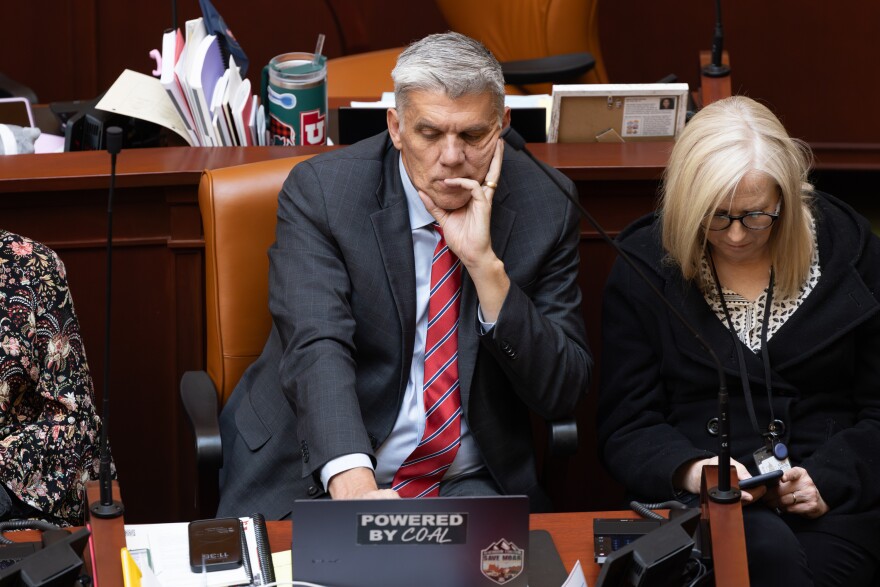Utah takes a self-described “all of the above” approach to energy. From coal to solar, the state has it all. But the balance between each is what’s up for debate at the state capitol.
“We're committed to finding what that ‘all of the above’ approach is,” said Speaker of the House Mike Schultz, R-Hooper, “But we are going to stand up and fight to keep our reliable, dispatchable power on.”
Republican leaders in the House and Senate have listed energy — particularly low-cost energy — as a top priority for this legislative session.
The question now is how much of a fight is the state willing to put up to keep aging power sources like coal operational?
Rocky Mountain Power, and its Oregon-based parent PacifiCorp, is the state’s largest power supplier. The company announced last spring that two of its coal-fired power plants will close by 2032, years ahead of schedule.
For Republicans, that’s thanks to the heavy hand of regulations from the Environmental Protection Agency that set new pollution standards for coal-fired power plants.
“The thing that's really concerning to me is that the federal government has set out to close our coal-fired power plants without another option for the citizens of the state,” Schultz said. “So we have to work to find what those options are. And there needs to be a transition, but it's got to be a responsible transition.”
In 2022, coal was responsible for 53% of the state’s total electricity generation, according to the U.S. Energy Information Administration. While still a majority, that number is down from 75% in 2015. In that time, solar energy, said the administration, has been responsible for 93% of the state’s new energy generation.
One bill in the Legislature would set regulations around when the state’s Public Service Commission can approve the early retirement of a power plant. While it does not specifically mention coal, “Electrical Energy Amendments” addresses the “forced retirement” of a facility due to federal regulations.
That focus on coal has some Democratic lawmakers concerned.
“States don't run those industries themselves,” said Sen. Nate Blouin, D-Millcreek. “They act as part of a larger market … I think we should be looking at our neighbors and what they're doing and trying to partner with them rather than trying to reject what they're doing and try to do our own thing.”
Blouin’s professional background is in renewable energy and he has proposals addressing geothermal energy and grid enhancements. For him, geothermal could be an easier transition for workers in traditional fossil fuel industries than other renewable forms of energy.
“The really cool thing about geothermal is it can put to work a lot of the same people who are in the oil and gas field because we're talking about drilling technology,” he said. “I want to make sure that people in rural communities keep having access to these good jobs in the energy industry that pay well.”
Despite the focus on coal, Republicans acknowledge that the market is moving.
“We all know we're on this journey to more climate-friendly, clean energy,” said Senate Majority Whip Ann Millner, R-Ogden. “We are going to have to do that in a really thoughtful way to make sure that at each step along the way, we're meeting the needs [of the state]. It's going to take a balance of everything.”
The fear, according to Millner and her colleagues, is that renewable sources are not yet as reliable as coal or natural gas. While Republicans might not want to give up on coal just yet, other forms of energy are getting cheaper.
Economic experts say that in the end, the market will ultimately decide the fate of Utah coal.
“The market can be, you know, a cruel master,” said University of Wyoming economics professor Rob Godby. “That uncertainty is very unpopular. And that often leads to a political demand to do something.”
The desire to delay the departure of coal from Utah is an understandable one, said Godby. Both from a loss of reliable power and a social standpoint of lost jobs due to plant closures. But whether there is long-term political will to prop up an industry the market continues to move away from is yet to be seen.
“Some of the choices made that are to try to avoid what's happening in the market are almost certain to increase the cost of electricity if they were to go through,” Godby said. “So then you get to a point where, socially, are the people of Utah willing to do that? Are they willing to pay higher prices to reduce the cost of [power plant] shutdowns to some of their neighbors?"






